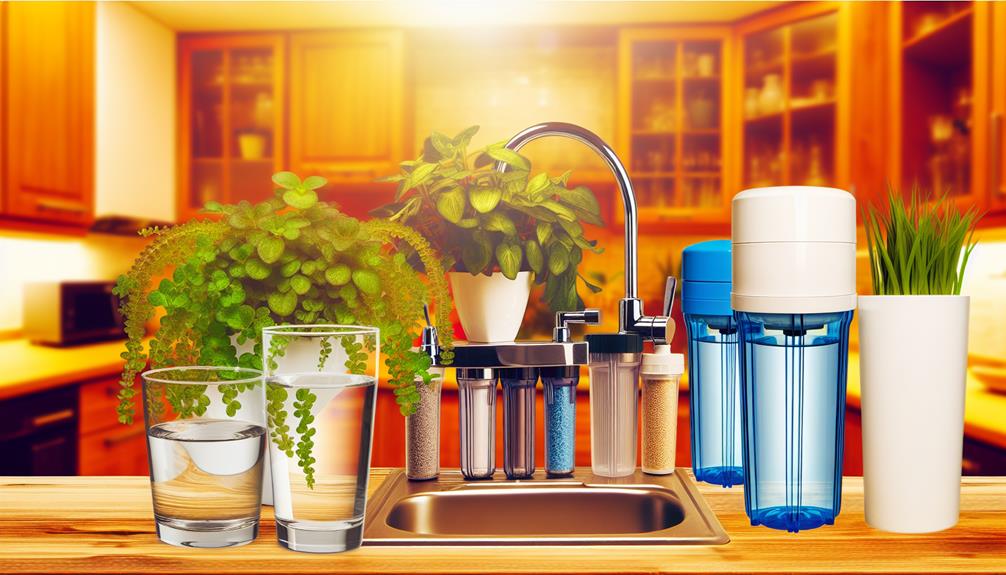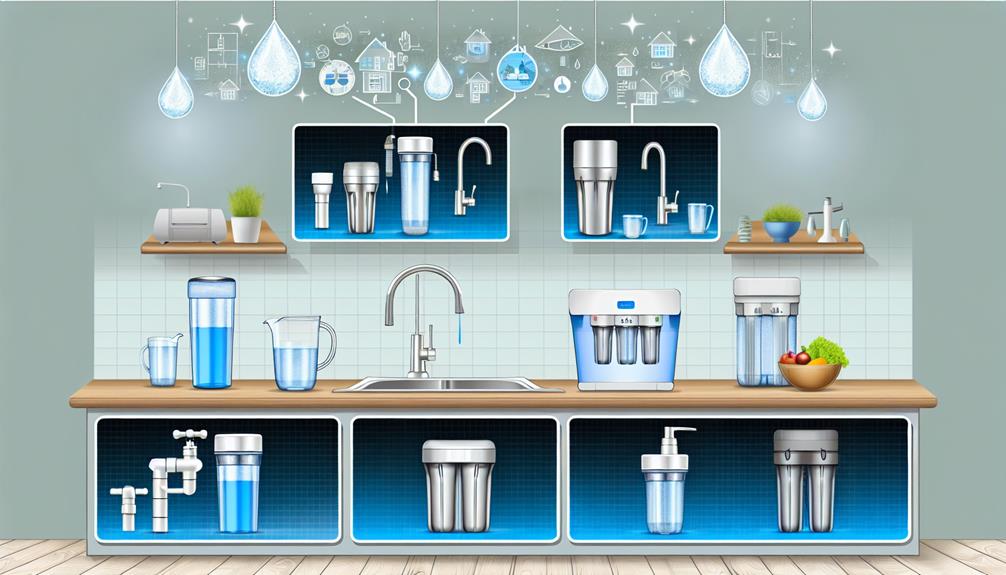You might think finding a reliable water filter installer in your area is like searching for a needle in a haystack, but it's simpler than you expect.
As you weigh the importance of clean drinking water against the complexity of modern filtration systems, you'll want someone who not only knows the ins and outs of the technology but also understands the unique characteristics of your local water supply.
Let's explore how to sift through the multitude of service providers to find those true wizards of water filter installation, without getting bogged down in technical jargon or sales pitches.
You'll discover not only how to identify the right expert for your needs but also what to expect during the installation process.
Stick with us, and you'll soon be on your way to enjoying pure, refreshing water straight from your tap, with the peace of mind that comes from a job well done.
Assessing Your Filtration Needs
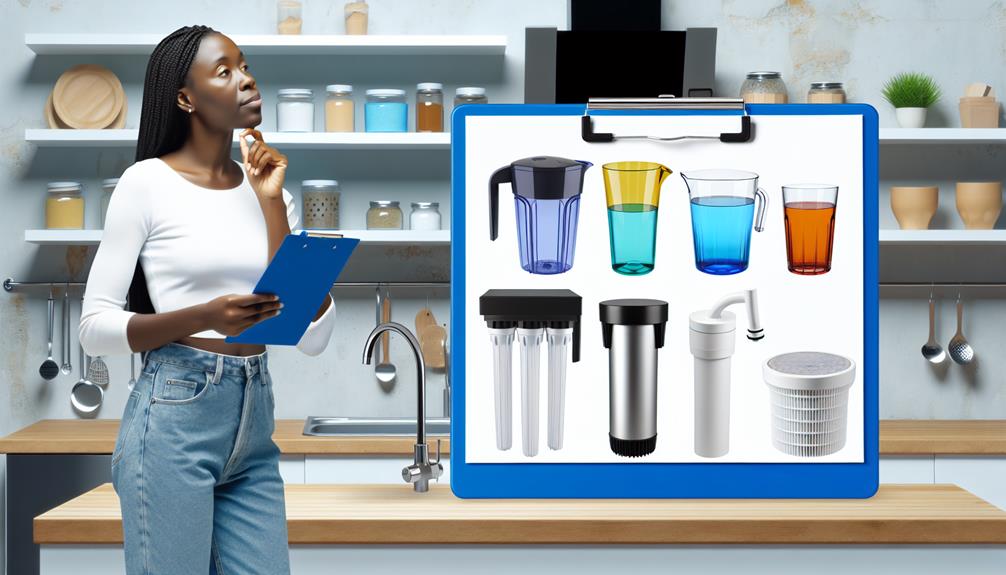
Before diving into the installation process, it's essential to pinpoint the specific contaminants you want to filter out of your water supply. Water hardness and contaminant levels are crucial factors that'll determine the type of water filter system you'll need. You've got to assess the water quality to understand what you're dealing with.
Start by obtaining a water quality report from your local water utility. This document usually outlines the levels of common contaminants such as lead, chlorine, and bacteria. If you're using well water, consider having a professional test done, as the contaminant levels can vary significantly from one location to another.
For water hardness, which is caused by minerals like calcium and magnesium, you'll need a water softener to tackle this issue. Hard water can damage appliances, leave residue on dishes, and affect your skin and hair. The severity of water hardness in your area will dictate the capacity and type of softener you'll require.
Don't overlook the less common contaminants like pesticides, pharmaceuticals, and industrial chemicals. You may need a more sophisticated filtration system, such as a reverse osmosis unit, to ensure these aren't present in your water. It's all about tailoring the solution to fit the specific problems you identify.
Types of Water Filters Explained
Understanding the various types of water filters is crucial, as each is designed to tackle specific contaminants and fit different household needs. When you're selecting a filter, pay close attention to the filter materials, which play a pivotal role in contaminant removal.
Firstly, there are activated carbon filters, which remove organic compounds, chlorine, and improve taste and odor. These filters use a bed of activated carbon granules that adsorb impurities as water flows through.
Reverse osmosis filters are another type, capable of removing a wide array of contaminants including fluoride, lead, and other dissolved solids. This system forces water through a semipermeable membrane, trapping contaminants on one side and allowing pure water to pass through.
Ion exchange filters are effective for softening hard water by exchanging magnesium and calcium ions with sodium or potassium ions. This process reduces scale buildup in plumbing and improves soap efficiency.
Ceramic filters contain small pores that mechanically remove bacteria and sediments from water. They often include an activated carbon core for additional contamination removal.
Lastly, ultraviolet (UV) filters use UV light to disinfect water by killing bacteria and viruses. It's important to note that UV filtration doesn't remove chemical contaminants.
Each filter type has its unique benefits, and you'll need to consider your specific water quality issues to choose the right one for your home.
Finding the Right Installation Expert
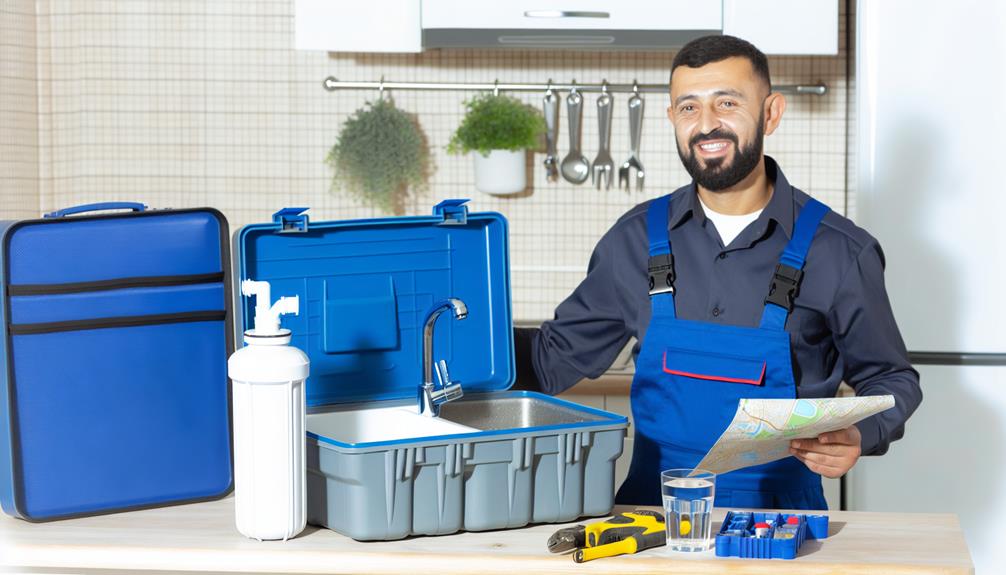
Once you've selected the ideal water filter for your needs, it's essential to partner with a skilled installation expert to ensure optimal functionality and efficiency. The installation process is technical and requires a knowledgeable professional who can manage both the mechanical and plumbing aspects, guaranteeing filter compatibility with your existing systems.
Here's how to find the right installation expert:
- Research Credentials: Look for certified technicians with a proven track record. They should have the necessary qualifications and be up-to-date with the latest installation standards and technologies.
- Check Reviews: Read customer testimonials and online reviews to assess the quality of their work and reliability. High ratings often indicate a trustworthy service provider.
- Evaluate Experience: Consider the length and breadth of their experience, especially with your type of water filter. Experienced installers will be able to handle unforeseen issues more effectively.
- Understand Installation Costs: Get detailed quotes from several experts to compare installation costs. Ensure that the prices are transparent and that they include all potential expenses to avoid surprises later on.
Installation Process and Timeline
After selecting a qualified installation expert, you'll need to familiarize yourself with the installation process and the expected timeframe for completion.
Initially, your technician will assess filter compatibility, ensuring the system you've chosen is a match for your existing plumbing. This step is crucial and can prevent costly modifications down the line.
Next, they'll provide an overview of the installation costs. These are typically upfront and include labor, additional parts, and any modifications needed to accommodate your new water filter. It's important to discuss all charges beforehand to avoid surprises.
The actual installation begins with shutting off your water supply to ensure a safe working environment. Your expert will then install the filter unit, which involves cutting into the pipe, fitting the filter, and securing connections. After installation, they'll flush the system to remove any debris and test the water flow, making adjustments as necessary.
The complete process, from start to finish, can take anywhere from a couple of hours to a full day. This timeline hinges on the complexity of the installation and any unforeseen challenges.
Once done, you'll be briefed on maintenance and how to replace filter cartridges, rounding out a comprehensive service experience.
Maintenance and Service Tips
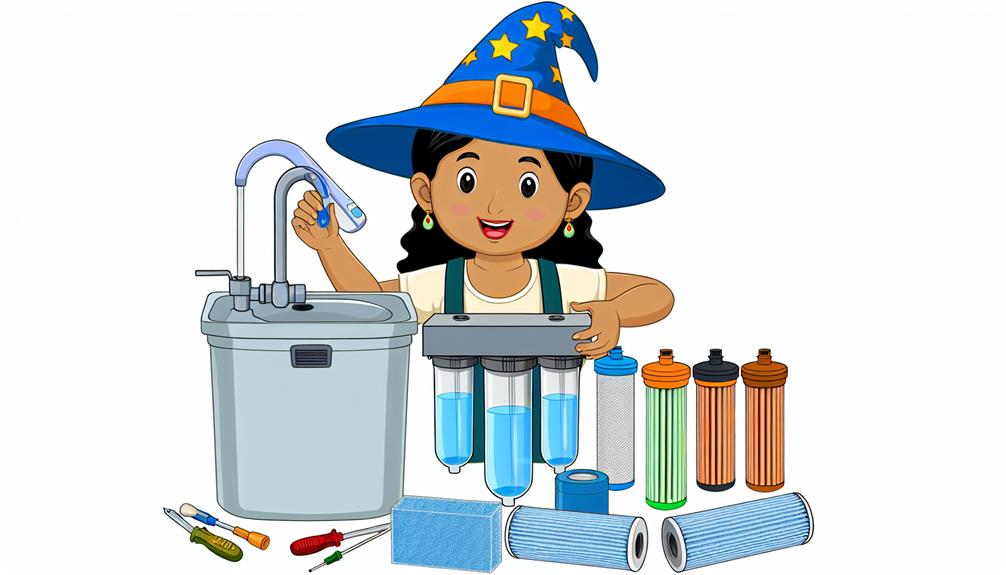
To ensure the longevity and efficiency of your water filter, it's essential to adhere to a routine maintenance schedule. Regular upkeep not only prevents unexpected breakdowns but also maximizes filter lifespan. Remember, a well-maintained filter ensures that you always have access to clean, safe water.
Here are some technical tips to keep your filter in top condition:
- Check Filter Cartridges Regularly: Depending on your water usage and filter type, cartridges may need to be replaced every six months to a year. Monitoring the flow rate can help you determine if it's time for a change.
- Clean Filter Housings: During cartridge replacement, clean the inside of the filter housing with a non-abrasive cleaner to prevent bacterial growth and ensure a proper seal.
- Update Seals and O-Rings: To avoid leaks, inspect and replace seals and O-rings periodically. A compromised seal can affect filter performance.
- Troubleshoot Proactively: If you notice changes in water taste, color, or flow, don't wait. Troubleshooting issues early can prevent more significant problems and maintain filter efficacy.
Conclusion
Now that you've navigated the waters of filtration and installation, you're set to maintain your system with ease. Remember, regular check-ups and prompt replacements are key to pure, clean water.
Trust your local wizards to keep things flowing smoothly. Stay informed, vigilant, and proactive about your water quality. Your health and peace of mind will thank you for it.
Drink up to a job well done!
